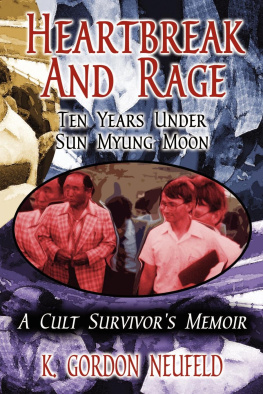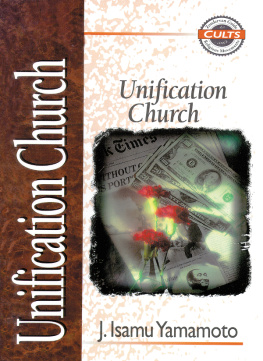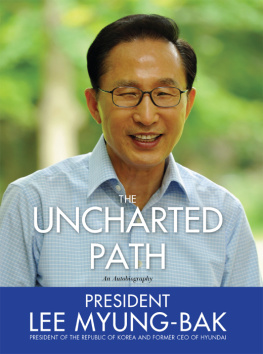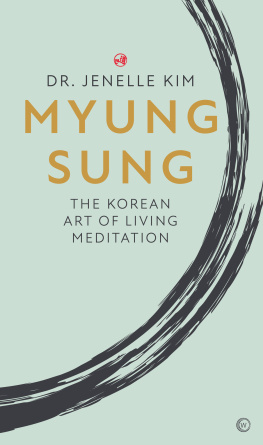Heartbreak and Rage: Ten Years under Sun Myung Moon.
ISBN: 1-58939-276-0 (softcover); 978-1-62137-519-7 (ebook).
Published 2002, 2014 by Virtualbookworm.com Publishing Inc., P.O. Box 9949, College Station, TX, 77842, US.  2002, 2014 K. Gordon Neufeld. All rights reserved. No part of this publication may be reproduced, stored in a retrieval system, or transmitted in any form or by any means, electronic, mechanical, recording or otherwise, without the prior written permission of K. Gordon Neufeld.
2002, 2014 K. Gordon Neufeld. All rights reserved. No part of this publication may be reproduced, stored in a retrieval system, or transmitted in any form or by any means, electronic, mechanical, recording or otherwise, without the prior written permission of K. Gordon Neufeld.
Manufactured in the United States of America.
This is a true story.
Nevertheless, except for the names of prominent
Unification Church leaders, all names have been changed
to preserve the anonymity of those involved.
Introduction
There are two stories in this book.
First, there is the story of a young man who was manipulated through mind control into joining a cult whose true nature he was not told about for some time; and when, after four years, the bonds of mind control began to fray and loosen, it nevertheless took another six years before he was ready to leave.
Second, it is the story of a person with desperate emotional needs who believed the religious group he had joined could address his needs; but later, when he concluded it could not, he left.
For those who have never experienced being caught up in a cult, these two narratives may seem contradictory. The public would like to believe that there is one single cause for cultism; that either cults draw their members exclusively from especially vulnerable and needy people; or alternatively, that they entrap their members through mind control, while their former psychological and emotional states played no part in the entrapment.
The truth lies somewhere between these two models of cult involvement. Certainly, emotional neediness may open a person up to cult involvement; it may even lengthen the time or alter the course of that persons involvement; but it cannot account for the incredible persistence a cult member will show in trying to remain with a cult long after it has stopped relieving his emotional neediness, and indeed has begun exacerbating it. And while mind control may be the clincher that gets a person thoroughly enmeshed in a cult, it should not be seen as a static condition that lasts for life. Rather, the bonds of mind control begin to rot and fray after only a few years, though they often leave lasting scars that can persist indefinitely unless treated.
In recent years, cult apologists have tried to assert that mind control has been discredited in the psychological community; but in fact, it is still widely accepted, and is even cited in the DSM-IV, the American Psychiatric Associations diagnostic manual, under 300.15, Dissociative Disorder NOS, a diagnosis that explicitly refers to cults and brainwashing.
That said, it is also true that mind control has often been misrepresented, leading the public to believe its victims become robotic and lose all ability to think independently. The reality is much more subtle: mind control merely erects road blocks in the mind, so that certain thoughts (such as the idea of leaving the group or going against its principles) become too frightening to be contemplated for long; however, in other respects, the victim of mind control appears normal. Those mental road blocks can be torn down without having to resort to drastic tactics such as deprogramming; nevertheless, when a cult member is forced to tear them down on his own, his recovery is apt to be slow and fraught with the peril that he may return to the group.
Unlike many other accounts written by cult survivors, this memoir recounts the complete arc of one persons cult involvementmy ownuninterrupted by a deprogramming. It describes in detail the entire process from the initial transfixion to the final letting go. It is my hope that this account will be of assistance to other cult survivors who are still struggling to attain a similar resolution of their own cult experiences.
K. Gordon Neufeld
Prologue:
The Knife Inside Me
I have always felt a desperate need to justify my existence. Of course, such a quest is impossible; yet knowing this has not prevented me from making it the driving force of my life. Since my birth in Edmonton, Alberta, Canada in 1953, and throughout my childhood in Calgary, I have felt that I do not have the right to exist, and that I must make amends to everyone else on Earth for the fact that I nevertheless continue to take up space on the planet.
Yes, I am aware that this is absurd; indeed, I have long sought to free myself from these thoughts. I used to experience the pain of this feeling as if it were a knife inside me, piercing me through the heart; and so I have longed for a waywhether through psychological therapy, or through the love of a womanto pluck this knife from my heart.
Three feelings are particularly connected to what I have called the knife inside me. First, there is a sense of worthlessness; secondly, a feeling of alienation from everyone else on Earth; and finallyand inevitablydepression.
It would be handy if I could offer some straight-forward psychological explanation for how I ended up feeling this way. Yet my childhood was a largely uneventful one. I grew up in a normal middle-class neighborhood and attended good schools, and I suffered no major traumas during that time. I can find no psychological explanation in my upbringing that can sufficiently account for the intensity of these feelings, and though I have a few theories about their origins, I will not explore them here.
Whatever the source of the knife inside me, its main effect has been to make me feel separate from everyone else. I was shy about initiating friendships throughout my school years, and the boys that I hung around with in grade school were mainly loners like myself. However, when I was old enough to attend dances or start dating girls, I found I could not attempt this at all. I was overwhelmed with feelings of guilt and shame whenever I even tried to approach girls. The only school dance I ever attended was a sock hop in the seventh grade. I felt so awkward and out of place at this dance, and so riddled with inexplicable guilt and shame afterwards, that I resolved never to attend a school dance again. I never did.
The guilt and shame I felt then was connected to the feeling that I did not have the right to exist. If I approached a girl, and she then rejected me, this twisted the knife still further inside me; it reinforced the feeling that I dont deserve to be, which (I felt) I ought to have known long before I dared to approach her.
I tried two different tactics during my school years to overcome my feelings of alienation. For a while, I became a quiet dreamerreading thriller novels and playing with model railroads and building model shipsso I could escape into my own fantasy world by losing myself in my private obsessions. For a while, I went to the opposite extreme and become the weirdest, most rebellious, and just plain oddball student at the entire school. In high school, I was famous for carrying around up to a dozen ballpoint pens at a time, with which I would do bizarre stunts such as simultaneously inserting them into my nostrils, ears and under my lips. Because of my penchant for wordplay, students would often ask me, Gordon whats the joke of the day? and I would try to make something up on the spot. These foolish tricks certainly got me attention, but not the kind I was hoping for; I became an amusing side show, but I still felt alienated from the others. As this sunk in, I became more and more depressed.
As early as age 13, the idea of suicide entered my thoughts, but fortunately I always pushed it away before it formed into any particular plan. One day in the eleventh grade, while pondering whether I should actually go through with my death wish, I came to a decision that instead I would try to make something of my life, even if I couldnt be everything I wished to be. From that moment on, I took more interest in my studies, and fared better in my grades, while toning down my antics.
Next page










 2002, 2014 K. Gordon Neufeld. All rights reserved. No part of this publication may be reproduced, stored in a retrieval system, or transmitted in any form or by any means, electronic, mechanical, recording or otherwise, without the prior written permission of K. Gordon Neufeld.
2002, 2014 K. Gordon Neufeld. All rights reserved. No part of this publication may be reproduced, stored in a retrieval system, or transmitted in any form or by any means, electronic, mechanical, recording or otherwise, without the prior written permission of K. Gordon Neufeld.